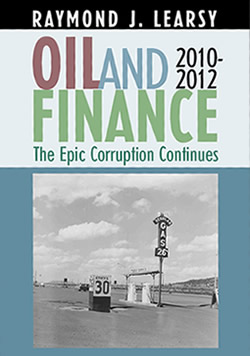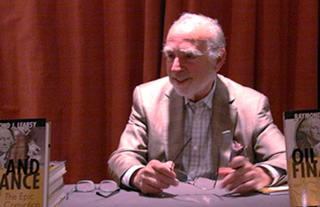OIL AND FINANCE: THE EPIC CORRUPTION CONTINUES

There is a pervasion of misinformation clouding the public’s understanding of how oil prices are really determined and the policies in place that have rigged the game to benefit the house dealers: the oil industry.
In this book, Raymond Learsy discusses how the rich and powerful have gamed a system to the detriment of the vast majority, documenting with cunning commentary and savvy wit how we’ve ended up with $4+ gasoline.
Why Oil Prices Are So High – And How We Can Lower Them
The Great Recession and the current energy crisis have brought America to a crossroads. Will it continue to conduct business as is or will it make dramatic changes to get the economy and the energy policy of the nation onto a healthy road toward recovery?
A new book insightfully, forcefully, and passionately condemns the oil industry, government, and Wall Street in a precision-filled attack that should enrage citizens. Oil and Finance: The Epic Corruption Continues –2010- 2012 (Create Space, March, Trade Paperback, 240 pages, $18; ISBN: 978-1469903293) )is an eloquent and cogent call to arms by Raymond Learsy, who draws on his extensive experience in commodities trading, with expertise in the shipping of oil and liquefied natural gas cargos, to methodically identify and document the free reign given to oil companies and the transgressions of financial firms.
Learsy regularly writes about the crude truth of oil for The Huffington Post and his writings on the international oil trade have appeared in the New York Times, Pipeline and Gas Journal, and National Review Online. His latest book, the third on the subject, provides a clear understanding of where we’ve been -- as a nation – and where we are headed with respect to our fossil-fuel consumption, and our place on the global stage. It uncovers the truth behind oil pricing, including its speculation and manipulation, the politics of oil and its impact on our security, oil’s influence on our domestic and foreign policies, OPEC’s unchecked power, and the menacing impact of oil on the environment.
He identifies and explains:
- The key factors fueling skyrocketing oil prices – and corrective solutions to combat them.
- How we can be on the verge of energy independence in the U.S.
- Why a CFTC task force must be formed so that a level playing field in the world of commodity trading, particularly that of oil, can be reached.
- What can be done to contain OPEC’s stranglehold on oil prices.
- Why the Strategic Petroleum Reserve is not being used strategically.
- Why the US should embargo Iran’s oil to halt its nuclear ambitions.
- How the lies or misstated facts about “peak oil” led to unnecessary price increases.
- Why both President Bush and President Obama coddled the oil markets.
- Why there’s an urgent need to form an American Energy NASA.
- Why natural gas must replace coal-fired power plants.
- How price gouging starts at the well.
- Why oil rose from $25/barrel in Bush’s first year in office to $147/barrel in his last year.
- How we can liberate our nation from its addiction to foreign oil.
- What can be done to combat the top 50 oil companies that are worth a record $1.7 trillion.
Learsy says a barrel of oil should cost less than $30, based on historical data and key indicators. He also believes we need to drill, baby, drill, open up nuclear power plants, investigate Wall Street’s price manipulations of oil, pass NOPEC legislation, and take advantage of the discovery of huge deposits of gas shale and engage in fracting on a wide scale. He also calls for converting our cars and trucks to run on gas instead of oil.
His goal is to enlighten the public – to anger them – and to drive them to hold their leaders responsible. He identifies with the Occupy Wall Street movement and believes a pervasion of misinformation clouds the public’s understanding of how oil prices are really determined. Further, he believes willful disinformation is circulated to make consumers meekly acquiesce to a rigged, manipulated, and speculator-driven market.
“Americans have been asked to open their wallets to pay for the greed of Big Oil, the failed policies of government, and their checkered thievery of Wall Street,” says Learsy, “but now we must also open our eyes to the truth of what has fueled the current state of affairs.
“No one likes high oil prices – except for the oil industry – as inflated prices lead to higher prices not just at the pump but for almost every product or service. It kills our economy and puts national security at risk. I hope everyone will be aware of the changes posed by the great oil conspiracy.”
Indeed, Learsy’s book reflects upon not only the causes of the problem but also provides many solutions. Oil and Finance provides a timeline of recent history that shows how the powerful and rich have gamed a system to the detriment of the vast majority, documenting with cunning commentary and savvy wit how we’ve ended up with $4 gasoline in the United States.
This book, in chronicling the corruption of a commodity that is essential to the world’s economic well-being, should also be taken as a forewarning of -- and a wake-up call to -- what lies ahead when core commodities are subject to political maneuvers, monopoly marketing, and financial manipulation.
“If we don’t change course now, we will have to confront an almost insurmountable crisis in the near future,” warns Learsy.
VIDEO
BIO

Raymond J. Learsy, a graduate of the Wharton School, made his life in the fast-paced, risk-filled world of commodities trading, beginning in 1959. In 1963, he started his own firm and over twenty years expanded from the U.S. into Canada, the United Kingdom, Luxembourg, Brazil, and Pakistan, trading in an array of bulk raw materials and commodities, shipping to customers worldwide. In the 1980s, he shifted gears as a private investor, from 1982 to 1988, served as a Reagan appointee to the National Endowment for the Arts...